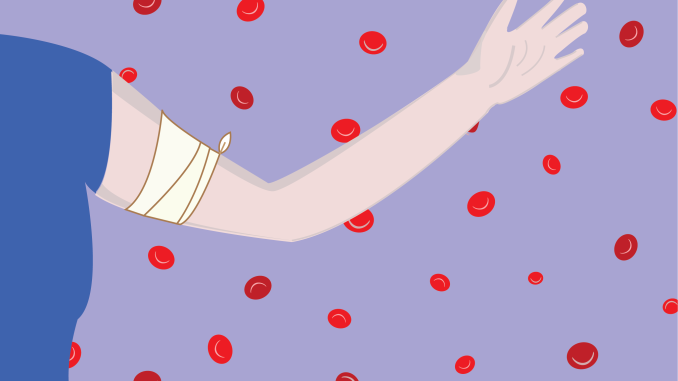
The American Red Cross announced on Jan. 11 that they’re facing their first-ever national blood crisis, and their worst blood shortage in more than a decade, according to their website.
It’s not uncommon for there to be an increased need for blood during January, because regular seasonal illnesses like the common cold and the flu, and winter weather, often lead to a decline in donations. However, COVID-19 has caused even lower donor turnout as cases began rising across the country in August.
Because January is National Blood Donor Month and the American Red Cross is experiencing a national crisis, students must make the effort to donate blood through local collection sites like the Philadelphia Red Cross Blood Platelet and Plasma Donation Center, Interstate Blood Bank Inc. and the Thomas Jefferson Blood Donor Center.
One donation alone can save three lives, according to Cedar Sinai, a nonprofit academic healthcare organization.
In general, blood drives are important for giving hospitals the resources they need to take care of patients who need blood, said Loretta Bassion, a nursing professor.
Blood is essential to help patients survive surgeries, cancer treatment, chronic illness and traumatic injuries, according to the American Red Cross.
However, because of the national crisis, doctors are forced to make decisions about who can receive blood transfusions immediately, and who will need to wait until more products become available.
Lifesaving blood may not be available for some patients when they need it as blood centers nationwide report having less than a one-day supply of certain critical blood types, U.S. News & World Report reported. Ultimately, some patients may die because hospitals do not have blood.
If doctors don’t have blood they will need to postpone surgeries, which can put the patient’s life further at risk, said Beth Heuer, a nursing professor.
“Patients can die because we know that blood saves lives and donations save lives,” Heuer said. “And that postponement can mean a death that didn’t need to happen.”
Blood donations are important for patients in need of surgery, cancer treatment and transfusions for blood loss from traumatic injuries. For example, with cancer patients, blood transfusions can act as a resource to implement platelets back into the body after heavy treatments, such as chemotherapy or radiation therapy, according to the American Red Cross.
Patients that are the most affected are those in need of blood for surgery, who would need to postpone their operation if there is not blood available, and cancer patients receiving chemotherapy, Heuer said.
“People don’t think about the wide range of what is needed for blood,” Heuer added. “So the idea that you could die in an emergency room, because you need blood cells and you can’t get them because of the shortage, is just terrifying.”
People don’t have to be in the healthcare community to help with the crisis, said Dana Senour, a senior nursing major who has donated blood before.
“We all have blood, and we all can give blood, which I think is really important,” Senour said.
The whole donation process takes about an hour. When donors first arrive, they will need to sign in and show ID, and will be asked to read required information. Next, the donor will receive a general health check before they’re able to donate blood. After donating, they are able to recover with a snack and drink before leaving the center, according to the American Red Cross.
Many people don’t donate blood because of their fear of needles. However, the actual process of drawing blood should cause very little, if any, discomfort.
“A lot of people think that you’re going to be hooked up to an IV and like, it’s super scary, which I can understand,” Senour said.
But, there are many ways nurses at the donation center can help students who feel uneasy, like putting a bag over the blood to prevent the donor from seeing it, or they can prevent you from seeing the needle, Senour added.
For those who feel they cannot overcome this fear, there are still other ways to help.
“If you’re not going to donate then tell a family member or tell a friend or someone like that because they might be willing to donate,” said Amanda Ngo, a junior nursing major who has donated blood before.
Older family members may have health conditions that make them ineligible, like high blood pressure or blood cancer. As COVID-19 and the weather continue to cause a decline in donations, students must step up in honor of National Blood Donor Month and make the effort to donate blood. It’s such a simple way for students to save lives, and to also save doctors from making these difficult decisions.
“That hour is worth it,” Heuer said. “That life you save is somebody’s grandma, somebody’s parent, somebody’s child.”



Be the first to comment